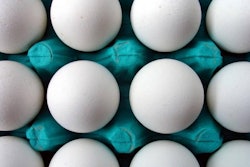
Poultry health experts predict that the H5 and H7 strains of avian influenza that have caused outbreaks in domesticated poultry operations on four continents may be carried by migrating birds for a number of years.
China has been at the center of the worldwide avian influenza situation for more than a decade, but it also is the world’s largest consumer market for animal protein. When Cargill began planning to build a modern broiler complex in China, the company was aware that taking effective measures to mitigate the risk posed by avian influenza needed to be an integral part of its plans. On a recent visit to the Anhui province of China, I saw firsthand how biosecurity practices on poultry farms have been ramped up.

Perimeter fencing for Cargill’s poultry farms in China is close to the houses, because the Chinese government reserves as much farmland as possible for food production.
Biosecurity at the poultry farm gate
My visit to a Cargill broiler farm located north of Chuzhou, a city of 3 million people that is about 200 miles northwest of Shanghai, began by staying away from any poultry or poultry facility for 14 days prior to my trip. While visiting the farm, we left our car outside the perimeter fence that surrounds the farm. Only essential vehicles, like chick trucks and feed trucks, enter the farm, and these vehicles pass through a truck wash immediately as they pass through the gate.

After passing through the gate at Cargill’s poultry farms in China, all trucks entering the poultry farm go through a truck wash.
Shower in shower out
After entering the farm through the locked gate, you take off your shoes and put on farm boots. You then walk through a disinfecting “tunnel” with a long dip pan. Then you enter a building where you sign a visitor log and conduct some sanitizing steps. First you sanitize your bare hands with wipes, then you use cotton swabs dipped in a sanitizing solution to swab out your nostrils and ears. Next, you rinse out your mouth with a disinfecting mouthwash and then leave the building and head for the showers.

Shower-in shower-out is just part of the rigorous biosecurity procedures employed on all of Cargill’s broiler, pullet and breeder farms in China.
The shower building has multiple doors that serve as entrances to individual changing rooms that lead to individual showers with a changing room on the other side. All visitors leave their clothes and everything else they brought with them, including jewelry and watches, in the first changing room. You then shower with soap and shampoo and exit into the changing room on the other side of the shower. You put on clean uniforms which are laundered on-site, boots and a head covering. Any equipment that needs to be brought on the farm that can’t be washed, like my camera, go through an ultraviolet light disinfection step and are picked up on the other side of the shower building. Even the bananas for employee snacks went through this step.
Biosecurity at the poultry house door
Upon exiting the shower building, you can walk around the farm. Each poultry house has an anteroom with a door to the outside as well as a door to the inside where the birds are housed. Upon entering the anteroom, you step into a series of two dip pans: one to rinse off dirt and the other to sanitize. If you want to enter the house and see the birds, you must first sit on a “bench” in front of the entrance door and take off your white “outdoor” boots, swing your legs over to the other side of the bench and put on the black “indoor” boots kept there. Then, you can open the door and walk through the birds.
The procedure with the boots is reversed to leave the house and then repeated to enter any of the nine poultry houses on the farm. The shower procedure is done in reverse when exiting the farm.
Poultry farm site selection and biosecurity
Christopher Langholz, president, Cargill Animal Protein China, said that the selection of Anhui province for the location of the company’s 65 million-broiler-per-year complex was influenced by the fact that no other major poultry operations are in the vicinity. This geographic separation offers a biosecurity advantage, but there are hundreds of millions of small farmers in China, many with backyard flocks of chickens and ducks.
Describing the search for suitable farm sites, Langholz said, “You have to have farmland without a lot of neighbors around, you have to have water underneath the land, and you have to have competitive feed cost. Once you have the land for the farms secured, you site everything else.”
The government controls the land in China and Cargill leases the land where the poultry houses were built. Langholz said Cargill was offered 100 pieces of land to choose from for farm sites, but the company wound up leasing only 35, 22 for broilers and the rest for breeders and pullets.
Geographic separation between poultry farms is good for biosecurity, but Langholz explained that in China, greater distance between the company’s farms also means that there are likely more small farms with other forms of poultry in between the company’s farms. So, in China, a poultry complex with a smaller geographic footprint, may or may not, have greater disease risk than would a complex with greater separation between its farms.

Fields of rice line the drive leading up to this Cargill poultry farm in China.
Because farmland is so highly valued in China, Cargill’s poultry farms are small from an acreage standpoint and this means that there is little distance between the poultry houses and the perimeter fences. Small farmers plant crops like rice and potatoes right up to their side of the fence. Langholz said that the concept of food security is still of major importance in China. Land that is classified as “foundational” can be taken over by the government in time of emergency to be used to grow food crops.
Cargill China poultry farm biosecurity measures
- Shower-in shower-out farms
- Poultry houses have concrete floors
- Total house cleanout after each flock
- Single-age, all-in all-out farms
- Farm employees live on-site
- Four veterinarians for broiler farms and one each for pullet and breeder farms
- Birds' drinking water is chlorinated and pH adjusted
- Perimeter fencing for farms with locked gate
- On-site laundry, dedicated boots for each house
- Dedicated feed trucks for delivery of breeder, pullet and broiler feeds


















